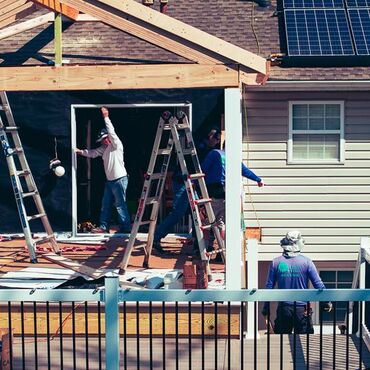Protect your home and your pocket from the risks associated with unlicensed contractors. Here are ten key facts you should be aware of:
1. In Maryland, operating as a home improvement contractor or salesperson without an MHIC license is illegal.
2. Some unlicensed contractors might have a criminal background or even be on probation.
3. Each year, Maryland residents lose millions to scams by unlicensed home improvement contractors.
4. There’s a risk of paying for incomplete or unnecessary work with unlicensed contractors.
5. Elderly homeowners are often the prime targets for these fraudsters.
6. A significant number of these contractors are from other states, making it challenging to recover funds or stolen items.
7. Be wary of suspiciously low quotes; they may demand more later or use bait-and-switch tactics.
8. Just because a contractor claims to be “Licensed and Bonded” doesn’t guarantee authenticity. Note that bonding companies usually don’t provide performance bonds for residential tasks.
9. Always verify the MHIC number displayed on a contractor’s vehicle with the MHIC itself to ensure it’s valid and matches the contractor.
10. Some may have lost their MHIC license previously due to poor work quality, incomplete tasks, or legal violations.
2. Some unlicensed contractors might have a criminal background or even be on probation.
3. Each year, Maryland residents lose millions to scams by unlicensed home improvement contractors.
4. There’s a risk of paying for incomplete or unnecessary work with unlicensed contractors.
5. Elderly homeowners are often the prime targets for these fraudsters.
6. A significant number of these contractors are from other states, making it challenging to recover funds or stolen items.
7. Be wary of suspiciously low quotes; they may demand more later or use bait-and-switch tactics.
8. Just because a contractor claims to be “Licensed and Bonded” doesn’t guarantee authenticity. Note that bonding companies usually don’t provide performance bonds for residential tasks.
9. Always verify the MHIC number displayed on a contractor’s vehicle with the MHIC itself to ensure it’s valid and matches the contractor.
10. Some may have lost their MHIC license previously due to poor work quality, incomplete tasks, or legal violations.
GUIDELINES TO SAFEGUARD YOUR HOME IMPROVEMENT EXPERIENCE
1. Request the contractor’s MHIC license and verify its authenticity online or by calling 1-888-218-5925 (toll-free) or 410-230-6231 (Baltimore area).
2. Obtain a current general liability insurance certificate from the contractor.
3. Secure local references. Engage with the references to gain insights about the contractor’s performance, responsiveness, and reliability.
4. If the contractor will be on your premises, ask for a current worker’s compensation insurance certificate.
5. Avoid seemingly overly generous offers. What looks like a great deal might lead to more expensive fixes later. Think twice before rushing into urgent repairs.
6. Ensure your contractor commits to securing all necessary permits if your project demands them.
7. Clearly define all material choices in a written contract. Seek legal advice if you’re uncertain about the contract’s content.
8. As a rule of thumb, only pay a deposit of up to 1/3 of the total cost.
9. Maintain a record of all project-related documents and payments.
2. Obtain a current general liability insurance certificate from the contractor.
3. Secure local references. Engage with the references to gain insights about the contractor’s performance, responsiveness, and reliability.
4. If the contractor will be on your premises, ask for a current worker’s compensation insurance certificate.
5. Avoid seemingly overly generous offers. What looks like a great deal might lead to more expensive fixes later. Think twice before rushing into urgent repairs.
6. Ensure your contractor commits to securing all necessary permits if your project demands them.
7. Clearly define all material choices in a written contract. Seek legal advice if you’re uncertain about the contract’s content.
8. As a rule of thumb, only pay a deposit of up to 1/3 of the total cost.
9. Maintain a record of all project-related documents and payments.
The Benefits of Hiring an MHIC-Licensed Contractor
- Commitment to Excellence and Accountability: MHIC-licensed contractors are held to stringent standards of professionalism, safety, and quality. Their comprehensive training and expertise ensure superior results. If they don’t meet these high standards, homeowners have the right to report these shortcomings to the MHIC or pursue legal channels for redress.
- Protection Through Insurance and the Guaranty Fund: MHIC mandates its licensed contractors to carry certain insurance policies, safeguarding homeowners from potential liabilities like property damages or injuries. Moreover, the MHIC’s Guaranty Fund is in place to compensate homeowners for actual losses incurred due to poor workmanship or contractual breaches by licensed contractors.
- Structured Payment, Contractual Clarity, and Recession Period: MHIC guidelines ensure that licensed contractors present homeowners with a transparent, written contract, clarifying work scope, payment terms, and timelines. Notably, homeowners also benefit from a “recession period,” allowing them to cancel the contract within a specific time frame without any penalties. This offers both clarity and flexibility, keeping homeowners’ interests at the forefront.
- Guaranteed Remedies and Conflict Resolution: With an MHIC-licensed contractor, homeowners have additional security layers. If the contractor doesn’t deliver as per the contract or if disputes arise, the MHIC provides mechanisms for mediation and resolution. This support ensures homeowners are equipped to handle post-contractual issues with confidence.
In sum, partnering with an MHIC-licensed contractor offers homeowners a blend of quality, protection, and peace of mind, especially with the added benefits of the recession period and the Guaranty Fund.







